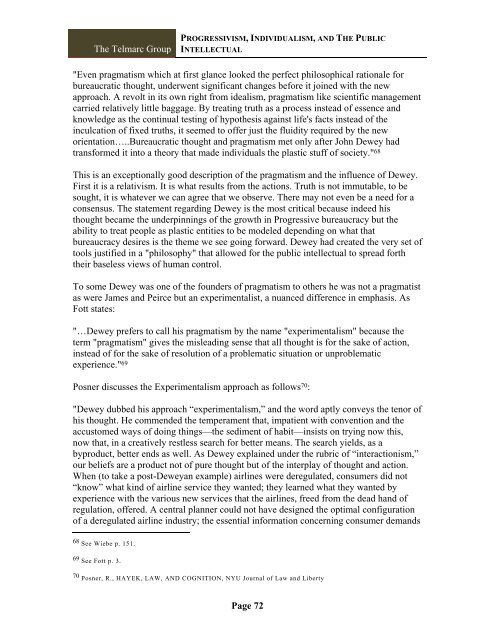progressivism, individualism, and the public ... - Telmarc Group
progressivism, individualism, and the public ... - Telmarc Group
progressivism, individualism, and the public ... - Telmarc Group
Create successful ePaper yourself
Turn your PDF publications into a flip-book with our unique Google optimized e-Paper software.
The <strong>Telmarc</strong> <strong>Group</strong><br />
PROGRESSIVISM, INDIVIDUALISM, AND THE PUBLIC<br />
INTELLECTUAL<br />
"Even pragmatism which at first glance looked <strong>the</strong> perfect philosophical rationale for<br />
bureaucratic thought, underwent significant changes before it joined with <strong>the</strong> new<br />
approach. A revolt in its own right from idealism, pragmatism like scientific management<br />
carried relatively little baggage. By treating truth as a process instead of essence <strong>and</strong><br />
knowledge as <strong>the</strong> continual testing of hypo<strong>the</strong>sis against life's facts instead of <strong>the</strong><br />
inculcation of fixed truths, it seemed to offer just <strong>the</strong> fluidity required by <strong>the</strong> new<br />
orientation…..Bureaucratic thought <strong>and</strong> pragmatism met only after John Dewey had<br />
transformed it into a <strong>the</strong>ory that made individuals <strong>the</strong> plastic stuff of society." 68<br />
This is an exceptionally good description of <strong>the</strong> pragmatism <strong>and</strong> <strong>the</strong> influence of Dewey.<br />
First it is a relativism. It is what results from <strong>the</strong> actions. Truth is not immutable, to be<br />
sought, it is whatever we can agree that we observe. There may not even be a need for a<br />
consensus. The statement regarding Dewey is <strong>the</strong> most critical because indeed his<br />
thought became <strong>the</strong> underpinnings of <strong>the</strong> growth in Progressive bureaucracy but <strong>the</strong><br />
ability to treat people as plastic entities to be modeled depending on what that<br />
bureaucracy desires is <strong>the</strong> <strong>the</strong>me we see going forward. Dewey had created <strong>the</strong> very set of<br />
tools justified in a "philosophy" that allowed for <strong>the</strong> <strong>public</strong> intellectual to spread forth<br />
<strong>the</strong>ir baseless views of human control.<br />
To some Dewey was one of <strong>the</strong> founders of pragmatism to o<strong>the</strong>rs he was not a pragmatist<br />
as were James <strong>and</strong> Peirce but an experimentalist, a nuanced difference in emphasis. As<br />
Fott states:<br />
"…Dewey prefers to call his pragmatism by <strong>the</strong> name "experimentalism" because <strong>the</strong><br />
term "pragmatism" gives <strong>the</strong> misleading sense that all thought is for <strong>the</strong> sake of action,<br />
instead of for <strong>the</strong> sake of resolution of a problematic situation or unproblematic<br />
experience." 69<br />
Posner discusses <strong>the</strong> Experimentalism approach as follows 70 :<br />
"Dewey dubbed his approach “experimentalism,” <strong>and</strong> <strong>the</strong> word aptly conveys <strong>the</strong> tenor of<br />
his thought. He commended <strong>the</strong> temperament that, impatient with convention <strong>and</strong> <strong>the</strong><br />
accustomed ways of doing things—<strong>the</strong> sediment of habit—insists on trying now this,<br />
now that, in a creatively restless search for better means. The search yields, as a<br />
byproduct, better ends as well. As Dewey explained under <strong>the</strong> rubric of “interactionism,”<br />
our beliefs are a product not of pure thought but of <strong>the</strong> interplay of thought <strong>and</strong> action.<br />
When (to take a post-Deweyan example) airlines were deregulated, consumers did not<br />
“know” what kind of airline service <strong>the</strong>y wanted; <strong>the</strong>y learned what <strong>the</strong>y wanted by<br />
experience with <strong>the</strong> various new services that <strong>the</strong> airlines, freed from <strong>the</strong> dead h<strong>and</strong> of<br />
regulation, offered. A central planner could not have designed <strong>the</strong> optimal configuration<br />
of a deregulated airline industry; <strong>the</strong> essential information concerning consumer dem<strong>and</strong>s<br />
68 See Wiebe p. 151.<br />
69 See Fott p. 3.<br />
70 Posner, R., HAYEK, LAW, AND COGNITION, NYU Journal of Law <strong>and</strong> Liberty<br />
Page 72












